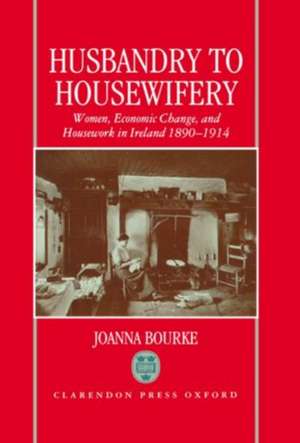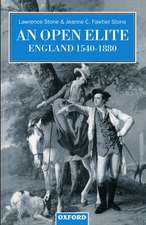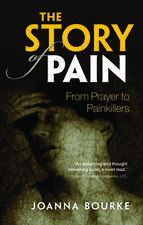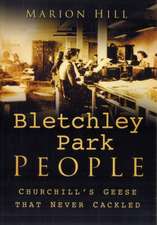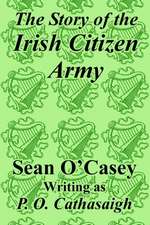Husbandry to Housewifery: Women, Economic Change, and Housework in Ireland 1890-1914
Autor Joanna Bourkeen Limba Engleză Hardback – 20 oct 1993
Preț: 314.92 lei
Preț vechi: 407.05 lei
-23% Nou
Puncte Express: 472
Preț estimativ în valută:
60.27€ • 62.26$ • 50.16£
60.27€ • 62.26$ • 50.16£
Carte tipărită la comandă
Livrare economică 15-21 martie
Preluare comenzi: 021 569.72.76
Specificații
ISBN-13: 9780198203858
ISBN-10: 0198203853
Pagini: 360
Ilustrații: tables
Dimensiuni: 146 x 217 x 25 mm
Greutate: 0.35 kg
Ediția:First
Editura: Clarendon Press
Colecția Clarendon Press
Locul publicării:Oxford, United Kingdom
ISBN-10: 0198203853
Pagini: 360
Ilustrații: tables
Dimensiuni: 146 x 217 x 25 mm
Greutate: 0.35 kg
Ediția:First
Editura: Clarendon Press
Colecția Clarendon Press
Locul publicării:Oxford, United Kingdom
Recenzii
'Joanna Bourke has written an important and stimulating study of the economics of housework in late nineteenth and early twentieth-century Ireland ... immensely informative book'Virginia Crossman, Linen Hall Review, Spring 1994
'This dissertation-derived book offers a rich fruit-cake of statistical detail and anecdotal evidence ... Bourke has beaten a well-trodden path in sampling and analysing the Irish manuscript censual data for 1901 and 1911. Her analysis of this exceptional source is subtle and careful.'Times Literary Supplement
'a complex and closely argued book ... It has been researched with formidable thoroughness and the analyses of such interrelated themes as female employment patterns, rural prosperity, and education for housewifery are challenging and important. Its readership should not be confined to either Irish or women historians.'Elizabeth Roberts, Lancaster University, Economic History Society 1994
'an important landmark in the writing of Irish women's history... refreshingly free of feminist jargon...Bourke's suorces are extremely impressive in their range.'Mary E Daly, Saothar 19
an important and original analysis of this contraversial subject...one of the great merits of Bourke's work is that she has conducted a far-reaching enquiry, elucidating on every aspect of female employment, including occupations which only on the surface appear to be unconnected to the production process...Bourke shows that careful research and the proper use of documentation provides ideas and incentives for a more flexible and broader analysis.
a lively and important book which explores new dimensions of Irish rural society in the post-famine period and in the process reveals the hidden treasures to be found in seemingly dull sources such as reports of the Irish Department of Agriculture
Bourke raises important questions in the study of women's lives.
This book sets new standards for the study of women's history in Ireland. No previous work has drawn upon so wide a range of primary sources or applied theoretical models to Irish data with such flair and sophistication. Those seeking to demolish intellectal barriers ... will derive both inspiration and practical guidance. Bourke assembles an astonishing range of unfamiliar material from hundreds of archival collections, parliamentary reports, newspapers, periodicals, pamphlets and books ... the immense but selective bibliography represents the most comprehensive search yet conducted for documents relating to Irish women and will prove invaluable to subsequent scholars of women's and economic history. By restoring women to the productive process, it challenges fundamentally our vision of Ireland's modernisation.
Joanna Bourke's work is a major contribution to Irish women's history. It has been eagerly awaited by Irish historians of women, though many of its arguments have been available through previously published articles.
'This dissertation-derived book offers a rich fruit-cake of statistical detail and anecdotal evidence ... Bourke has beaten a well-trodden path in sampling and analysing the Irish manuscript censual data for 1901 and 1911. Her analysis of this exceptional source is subtle and careful.'Times Literary Supplement
'a complex and closely argued book ... It has been researched with formidable thoroughness and the analyses of such interrelated themes as female employment patterns, rural prosperity, and education for housewifery are challenging and important. Its readership should not be confined to either Irish or women historians.'Elizabeth Roberts, Lancaster University, Economic History Society 1994
'an important landmark in the writing of Irish women's history... refreshingly free of feminist jargon...Bourke's suorces are extremely impressive in their range.'Mary E Daly, Saothar 19
an important and original analysis of this contraversial subject...one of the great merits of Bourke's work is that she has conducted a far-reaching enquiry, elucidating on every aspect of female employment, including occupations which only on the surface appear to be unconnected to the production process...Bourke shows that careful research and the proper use of documentation provides ideas and incentives for a more flexible and broader analysis.
a lively and important book which explores new dimensions of Irish rural society in the post-famine period and in the process reveals the hidden treasures to be found in seemingly dull sources such as reports of the Irish Department of Agriculture
Bourke raises important questions in the study of women's lives.
This book sets new standards for the study of women's history in Ireland. No previous work has drawn upon so wide a range of primary sources or applied theoretical models to Irish data with such flair and sophistication. Those seeking to demolish intellectal barriers ... will derive both inspiration and practical guidance. Bourke assembles an astonishing range of unfamiliar material from hundreds of archival collections, parliamentary reports, newspapers, periodicals, pamphlets and books ... the immense but selective bibliography represents the most comprehensive search yet conducted for documents relating to Irish women and will prove invaluable to subsequent scholars of women's and economic history. By restoring women to the productive process, it challenges fundamentally our vision of Ireland's modernisation.
Joanna Bourke's work is a major contribution to Irish women's history. It has been eagerly awaited by Irish historians of women, though many of its arguments have been available through previously published articles.
